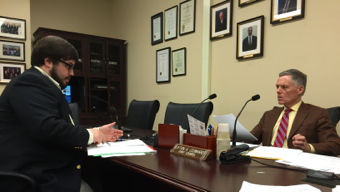 A settlement agreement between the City of Ansonia and a former zoning officer that officials have refused to release for nearly a year should not be shielded from the public, a hearing officer for the state’s Freedom of Information Commission has concluded.
A settlement agreement between the City of Ansonia and a former zoning officer that officials have refused to release for nearly a year should not be shielded from the public, a hearing officer for the state’s Freedom of Information Commission has concluded.
The March 5 report of the hearing officer, Clifton Leonhardt, comes two months after the Valley Indy argued during a hearing in Hartford that the document should be divulged.
The city released the document late Monday.
Background
The May 2014 agreement resolved a labor complaint the former zoning and anti-blight officer, James Tanner, filed against the city months after he was fired by Mayor David Cassetti in December 2013.
Tanner was one of a handful of officials Cassetti replaced with new appointees soon after taking office.
In the complaint Tanner said he wanted his old job back, as well as back pay, lost benefits, and attorney’s fees. He was earning about $46,000 annually in the position when he was terminated.
But Tanner dropped the complaint after reaching a settlement the city’s lawyer would describe only as “not monetary” in nature.
City officials refused to release a copy of the actual settlement because they said the document contains a confidentiality clause prohibiting its disclosure unless “a legal authority” compels it.
The Valley Indy filed a complaint with the state’s Freedom of Information Commission seeking the document’s release because the FOI Act itself and prior decisions from the commission say agreements between public agencies and employees should not be shielded from the public.
Hearing Officer: Give It Up
The hearing took place Jan. 20 with Leonhardt presiding.
There, Christopher Sugar, a lawyer representing Ansonia, said the only reason they would not release the document is because Tanner and his lawyer objected, alleging the release would constitute an invasion of Tanner’s privacy.
Article continues after audio of the proceeding.
Sugar, the city’s lawyer, submitted a copy of the settlement agreement during the hearing for Leonhardt to review privately.
The state’s Supreme Court decided in 1993 that in deciding whether a public document’s release would constitute an invasion of privacy, the document must not pertain to legitimate matters of public concern and also be “highly offensive to a reasonable person.”
In a three-page report dated March 5, Leonhardt wrote that after reviewing the document, he concluded it “pertains to a legitimate matter of public concern and that disclosure of these records would not be highly offensive to a reasonable person.”
Article continues after document.
Leonhardt also noted that the FOI Commission “has on numerous previous occasions ruled, when addressing the issue of the disclosure of settlement agreements entered into by public agencies, that such agencies may not contract away the public’s right to know” by inserting confidentiality clauses into such documents.
“Moreover, in this case … the confidentiality clause contained in the settlement agreement specifically recognizes that the parties may be required to disclose such agreement if ordered by an appropriate legal authority,” Leonhardt wrote on.
“It is therefore concluded that the confidentiality agreement does not supersede the FOIA and that the failure of the respondents to promptly disclose the settlement agreement constituted a violation (of the FOI Act),” Leonhardt wrote.
He recommended the FOI Commission order the city to provide a copy of the settlement agreement to the Valley Indy.
The Freedom of Information Commission will consider Leonhardt’s report at a meeting scheduled for April 8.
The Settlement Agreement
John Marini, the city’s corporation counsel, released a copy of the settlement Monday, saying the confidentiality clause should not have been included in the agreement.
The handwritten settlement agreement, dated May 28, 2014, is three paragraphs, one of which is devoted wholly to preventing the details of the agreement from being divulged: “The undersigned agree not to disclose the filing of the instant complaints or terms of this settlement agreement, except for the enforcement thereof, unless ordered to do so by an appropriate legal authority.”
Beyond that, the settlement calls on Tanner to drop his labor complaint against the city
In return, the city promised that, if a prospective employer were to inquire about Tanner’s tenure as a city employee, “the city shall only provide dates of employmen(t) and position held.”
The settlement agreement is posted below.